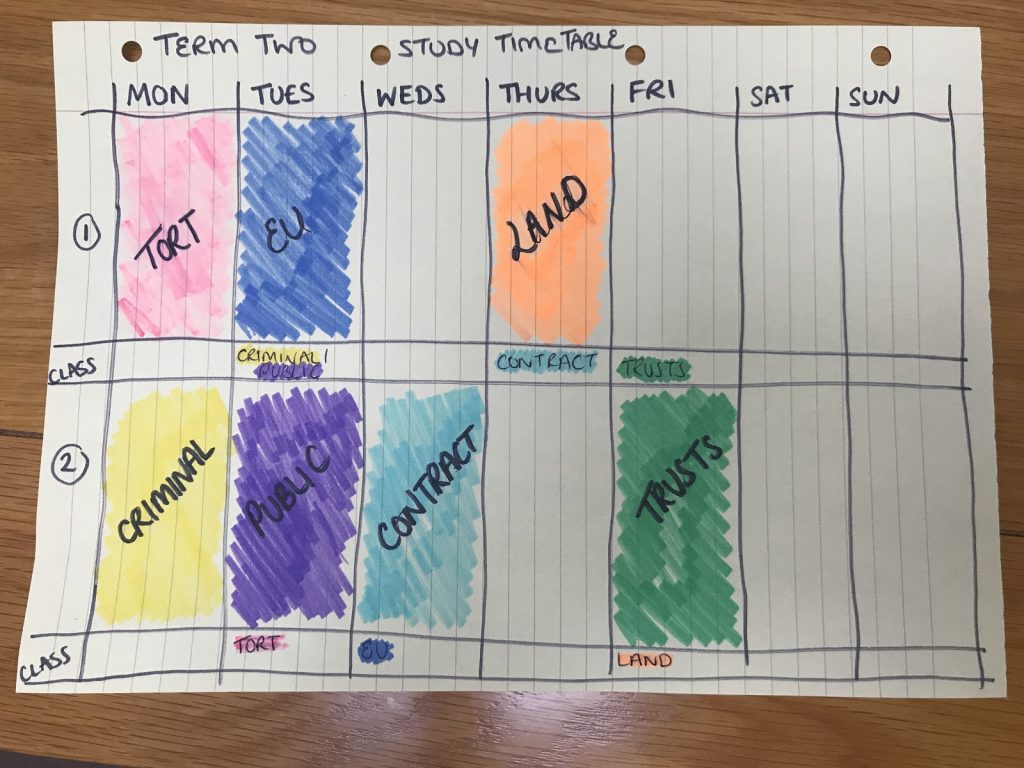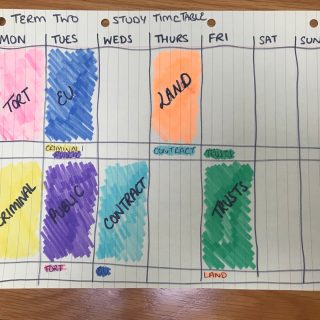I remember, so vividly, being sat in a lecture theatre on day one of the GDL feeling instantly overwhelmed by the amount of things that I needed to organise. As one of the many wannabe barristers on the GDL at City, I knew from the start that my GDL was focused on securing pupillage. I was keen to make a dent in the endless list of opportunities at City: mooting, pro bono, evening workshops and chambers evenings.
As I am sure was the case for many, my undergraduate degree afforded me four modules per year whereas the GDL involves seven core modules plus three extra ones. To stay on top of work and to take full advantage of extra-curriculars, it is important to be organised. It is easy to get bogged down on focusing on an upcoming moot and totally forgetting to prep for a tutorial. With that in mind, I have come up for five top tips for staying organised on the GDL.
1. Make a study timetable … and stick to it
I devised a fortnightly time table for each term that blocked out full days to work on a particular subject. On that day, I would do the core reading and the tutorial questions – that way I knew I would get something out of each lesson, even if I had other things on. It is easy to fall behind when you have lots on and keeping up with the course eases the burden during exams. Working on a two-week schedule also allowed for buffer days to prepare for moots, write applications or undertake minis. It also sets a clear checklist so you never feel like you aren’t progressing.

The way you organise your work does not have to be the same as everybody else – the important thing is to establish a routine. I had worked full-time for two years prior to starting the GDL which meant I was out of practice with studying. Creating this routine made studying more like a job insofar as I had short deadlines and lots to balance. Some days will be more productive than others, but I always made sure that I stuck to my routine so that I could use the teaching offered by City most effectively.
2. Use the tutorials to your advantage
I would start with the tutorial questions and work backwards. There is no need to know absolutely everything (even though it may feel like it!) so it’s best to understand the legal concept and use the tutorials to clarify ideas. The lecturers at City use the tutorials to go through the set questions which prompts discussion about specific cases and judicial comment. This, coupled with contributions from classmates, means that focusing on a productive tutorial can bear more fruit than simply reading a textbook. Your classmates are also in the same boat as you; working with others also helps to share the load and develops your understanding of a topic.
For example, a criminal law tutorial might present a scenario where someone has died and there are numerous things to consider. It is important to separate these issues out. For instance, if there has been a murder and there seems to be no issue with actus reus or mens rea, you will need to consider defences to murder. Instead of jumping straight in, separate the reasons why you think there might be defences out individually: is there a recognised medical condition at play or has the defendant been provoked? Breaking down the factors (i.e. exploring an instance of sexual infidelity or a schizophrenic episode) means that you properly consider all aspects of the question. Remember: the words of the questions are chosen carefully to include a range of issues!
3. Be realistic with what you can commit to

It is easy to spend your life doing law related things but remember that rest (and a social life) is important too. This is particularly easy to do on a course that is designed to lead to a particular career path. Many students choose City because of its reputation to law firms and sets. It is an incredibly competitive environment and the aim of a training contract / pupillage can be all consuming. It is important to make sure you have a breadth of experience without overburdening yourself. This can come in the form of practical limitation as well as time-management.

On the first point, I picked a pro-bono project that suited my practice interests but also was flexible and regular. My project (CommUnify) was always on a Tuesday and I could pick when I was able to attend. I commuted throughout the GDL and so would have found it practically difficult to do projects that involved too much travel. This meant that I knew I was able to commit to attending. City offered lots of pro-bono opportunities so it was easy to find one that suited my needs. Similarly, I limited myself to two mooting competitions so that I did not detract too much from my studies. I did both with City (Cecilia and the Internal) so that I could find my feet amongst my peers.
On the latter point, ensuring that you do your studies, moot, undertake pro-bono, complete mini-pupillages – as well as a mountain of other things – can be incredibly burdensome. These things are important but do not need to be done simultaneously. I was fortunate enough to have completed a few minis before I started at City so they were not a priority for me whereas Mooting, of which I had done none, was. I focused on mooting in my first term and more on pro-bono in my second. There can feel the pressure to get everything done before the pupillage deadline but, from my experience of interviews, I was asked what has changed since my application. Chambers were alive to the fact that some projects were new and/or ongoing.
4. Take advantage of the coursework.
Extra essays often become a task that drops down your to-do list. I did not do any courseworks until March; I wish I had done. Doing the essays gives you the chance to see the level you are working at and can steer you in the right direction. I know from personal experience the impact that getting concrete feedback can have; it might soothe any fears about a particular module or give you a push to polish your knowledge of another. Getting essay practice in before exams was particularly important for those (including me) who had been employed prior to the GDL and were severely out of practice when it came to essay writing. Writing essays also gets you into a good rhythm of coming up with arguments and academics related to a topic; this is an invaluable resource when revising for exams. These arguments also apply to the mocks; I did all seven and whilst it was tiring, it gave me such a good basis for exams and meant that I knew exactly what I needed to work on during my revision. All feedback (good or bad) is constructive so use your teachers!
5. Mooting

Demonstrating prowess as an advocate is essential to any person wanting to secure pupillage. Mooting is a really great way to develop your skills as an advocate. It gives you the chance to test your ability to deconstruct a problem and come up with a legal solution. If you do well, it is a great addition to pupillage applications to show that you are a strong advocate. I did not know what a moot was before I started at City. City had organised for 4 New Square Chambers to come in to give a talk and a workshop on mooting. This was a great introduction on how to write a skeleton argument, how to present, and a chance to meet new people on the course. It gave me the confidence to enter my first moot, which I did alongside a friend. It was an invaluable and enjoyable experience. The final display of work after weeks of preparation gave me such a rush – something that helped remind me of why I want to be a barrister – which can be forgotten when buried in work!
For those in a similar position to what I was, I would thoroughly recommend attending mooting workshops. It eliminated the initial trial-and-error issues related to what judges expect. Doing moots with City means that they are relatively spread out which means that you aren’t trying to prepare for three moots simultaneously. There is lots of support for mooting at City, particularly on Lawbore (see Mooting on Learnmore), so take advantage!

Thanks to Lissy Verrall for this helpful piece. Lissy completed her undergraduate degree in Government and History at the London School of Economics. Following which, she worked at the Ministry of Justice. Lissy completed the GDL at City in 2019/2020.

